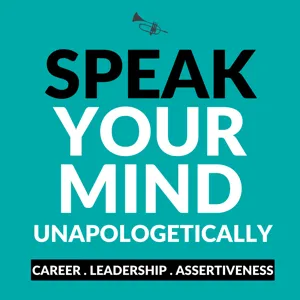Podcast Summary
Replace Certitude with Curiosity and Humility for Growth and Learning: Embrace doubt and be willing to challenge your own beliefs and those of others. Admit when you're wrong and encourage learning and growth by questioning and challenging.
In Hollywood and society as a whole, we often celebrate certainty and look down on those who express doubt, caution, and hesitation. However, this can lead to a lack of growth and learning. Instead, it's important to replace certitude with curiosity and humility. By questioning our own beliefs and challenging our views, we can expand our knowledge and become better leaders. Organizational Psychologist Adam Grant explains that it's important to not only be able to admit when we're wrong, but also to challenge others when they say or do something wrong. Agreeableness may make this difficult, but it's necessary for growth and progress.
The Dangers of Being Too Agreeable and Stubborn: Being too agreeable can hinder leadership and decision-making, and the First Instinct Fallacy can lead to regrets and obstinacy. It's important to strike a balance and recognize the biases that can negatively impact success.
Being agreeable can have downsides, as highly agreeable people tend to be worse at leading organizations and teams than people who are somewhere in the middle of that spectrum. Agreeable people are also prone to agreement bias, where they say yes to something that's not in their best interests. The First Instinct Fallacy, where people believe that their first thoughts are their best thoughts, can also hinder decision-making. Intuition is often just subconscious pattern recognition from the past, which may not be relevant to the present problem. Regret and pain from undoing the right answer can also lead to stubbornness and obstinacy. This can be seen in the story of the rise and fall of Blackberry, a cautionary tale for the dangers of being too stubborn.
The Importance of Flexibility in Thinking: It's important to be open to rethinking our beliefs to avoid negative consequences in our personal, professional, and political lives. Overcoming obstinacy can be achieved by being aware of the benefits of considering alternative perspectives and actively seeking out different viewpoints.
Being open to rethinking our beliefs is crucial in avoiding major consequences in our personal, professional, and political lives. The use of examples such as Blackberry's downfall and the Challenger disaster highlights the importance of flexibility in thinking. However, obstinacy can often drive our reluctance to rethink our opinions, leading to missed opportunities and disastrous outcomes. Overcoming this psychological pain is crucial, and can be achieved by being aware of the benefits of considering alternative perspectives and embracing a growth mindset, alongside actively seeking out different viewpoints, being open to feedback, and showing empathy towards those with differing opinions.
The Soup Nazi and the Importance of Task and Relationship Conflict in Teams: Task conflict, debating different perspectives, leads to better decision making, while relationship conflict, taking disagreement personally, can be destructive. Successful teams handle both conflicts for creative solutions.
The Soup Nazi from Seinfeld is an example of how task conflict can easily become relationship conflict. The Soup Nazi could not handle any disagreement or criticism in his soup shop without taking it personally and banning customers. In contrast, task conflict, where people debate different perspectives to try to get to the truth, can be constructive for teams as it allows for diversity of thought and can lead to better decision making. Successful teams are able to handle both task and relationship conflict, realizing that conflict is not always a bad thing and can help lead to creative solutions.
The Impact of Conflict on Group Performance: Relationship conflicts can harm group performance by creating personal biases. Task conflicts, however, can encourage idea generation. Leaders must differentiate beliefs and values from personal identity and promote task conflict for effective communication and goal achievement.
Relationship conflicts can hinder group performance by shutting down voices and leading to personal interpretation of issues. Task conflict, on the other hand, can be useful in generating ideas. It is important to differentiate beliefs and values to avoid mistaking them for identity in professional settings. Leaders should model task conflict without relationship conflict to promote effective communication and a focus on common goals.
The Importance of Effective Communication: Beyond the Message: Communication is not just about what is being said, but also about how it is being said and by whom. To improve communication, we need to listen humbly, remain curious, and be open to diverse perspectives rather than clinging to our own beliefs and identities.
Communication is not just about the message, but also about the messenger, the intention, and the delivery. Useful criticism can be rejected due to lack of trust or respect for the person giving it. Our egos often prevent us from listening to feedback, and we cling to our beliefs to feel strong. Our group identities and loyalties also contribute to our stubbornness and inflexibility, as we adopt preacher or prosecutor mode. To overcome these obstacles, we need to approach communication with humility, curiosity, and openness to different perspectives.
Challenging Beliefs for Important Discoveries: It's important to challenge your own beliefs and arguments to make important discoveries, and organizations and teams can play a role in helping us rethink our views. Being open-minded and avoiding the first instinct fallacy is crucial for success.
Psychologist Adam Grant argues that it is important to challenge our own beliefs and arguments if we want to make important discoveries. The Wright Brothers are a great example of this, as they constantly argued when trying to invent their airplane but mastered the ability to have productive task conflicts without it spilling into relationship conflict. While not all of us have a sibling or partner who can play this role for us, organizations and teams can be part of playing the same role in helping us rethink our views. Steve Jobs is also an example of this, as he was famously stubborn and nearly missed out on inventing the iPhone due to the first instinct fallacy.
The Power of a Challenge Network for Better Decision-Making: Having both a support network and challenge network is important for making better decisions. To be open to new perspectives, use strategies like asking intriguing questions instead of being defensive or argumentative.
We need a challenge network in addition to a support network to help us question our own thinking and make better decisions. Steve Jobs was fortunate to have a group of people who played that role for him, and it ultimately led to the creation of the iPhone. Often, our initial response to being challenged is to become defensive or argumentative, but we can use strategies like asking intriguing questions to activate our curiosity and open ourselves up to new perspectives. This can be especially useful when trying to change the views of others. Logic alone may not always be effective in changing minds, but coming at the issue sideways can be a powerful strategy.
The Dancing Metaphor for Disagreements: Finding Common Ground through Effective Debating: Effective debaters don't bully, find common ground, ask questions and are open to concessions. Disagreements are like a dance, partners get in sync and take turns leading. This approach encourages critical thinking and open-mindedness.
Bullying someone into changing their mind is not effective, and may only lead to lip service compliance. Effective debaters spend more time finding common ground and asking questions to understand the other person’s views. They are also willing to make concessions and express humility by admitting they are not sure about certain things. A better metaphor for disagreements is a dance, where partners must get in sync and take turns leading. This approach can be applied in education to encourage critical thinking and open-mindedness.
Encouraging Rethinking for Innovation: Creating a culture of learning through multiple drafts and critique sessions and cultivating psychological safety promotes creativity and innovation by allowing individuals to feel comfortable taking risks and bringing up concerns.
Encouraging individuals to rethink their initial thoughts can lead to creative and innovative solutions. Ron Berger, a public school teacher, exemplifies this through his use of multiple drafts and critique sessions in his classroom. This approach teaches students that initial work is open to being reinterpreted and improved upon over time, leading to a culture of learning. Additionally, creating psychological safety within a team or organization, where individuals feel comfortable taking risks without fear of punishment, is crucial for promoting creativity and innovation. Psychological safety allows for individuals to bring up concerns and mistakes, leading to a culture of learning and improvement rather than hiding mistakes and repeating them.
The Importance of Accountability in Creating Psychological Safety: Conversations with opposing views can lead to open-mindedness, refrain from proposing solutions and gain a deeper understanding by asking questions. Foster intellectual humility and curiosity to know when to stay the course and when to shift gears.
Creating psychological safety is essential, but it requires accountability, not just niceness. Nuanced and thoughtful conversations with those who disagree with us can lead to more moderate views and open-mindedness. It's important to be aware of solution aversion and refrain from immediately proposing solutions, instead asking questions to gain a deeper understanding. Intellectual humility and curiosity can be fostered through the illusion of explanatory depth, which prompts us to explain complex systems and their impact. Inflexibility and persistence are valuable traits, but it's an art to know when to stay the course and when to shift gears.
The Power of Rethinking: Being Flexible and Adapting for Long-Term Success: Rethinking involves staying true to your principles and goals while being open to new strategies. Slow, deep thinkers can offer valuable insight, and seeking feedback can accelerate the process. Proactive rethinking allows for greater adaptability and evolution towards desired outcomes.
Being open to rethinking doesn't mean changing your principles or overarching goals, but rather being flexible in finding the right strategies to achieve them. While rethinking may slow us down in the short-term, it can lead to long-term benefits. We should pay attention to slow, deep thinkers and accelerate our own rethinking processes by taking a few minutes to consider the potential flaws in our plans and seeking feedback from our challenge networks. The pandemic has forced many to rethink their convictions, but we should also take the initiative to do so proactively before we are forced to. The power of rethinking lies in our ability to adapt and evolve towards our desired outcomes.




